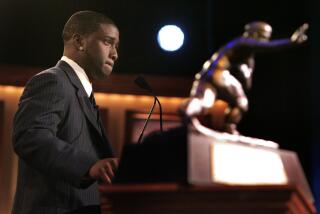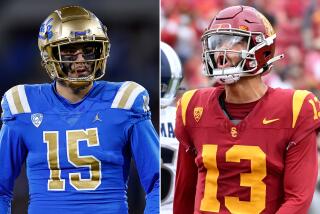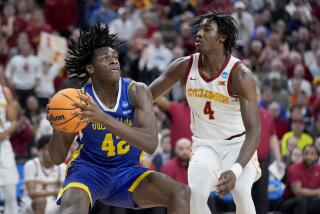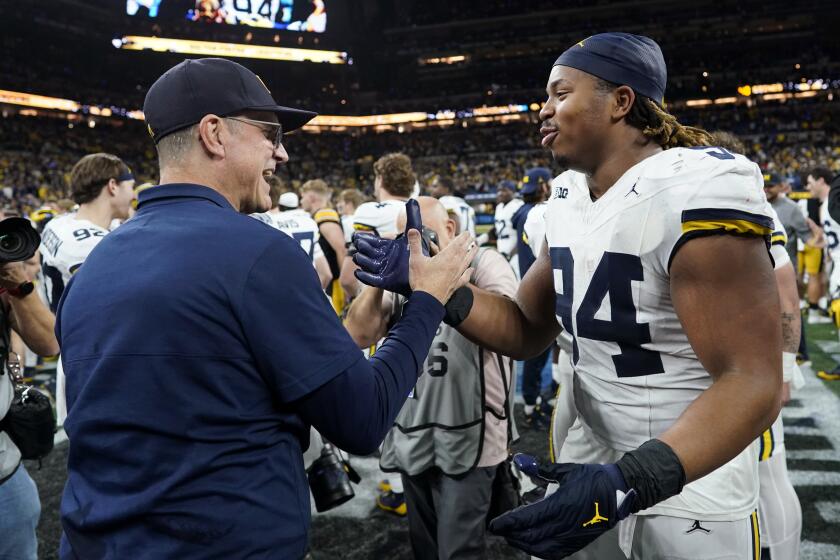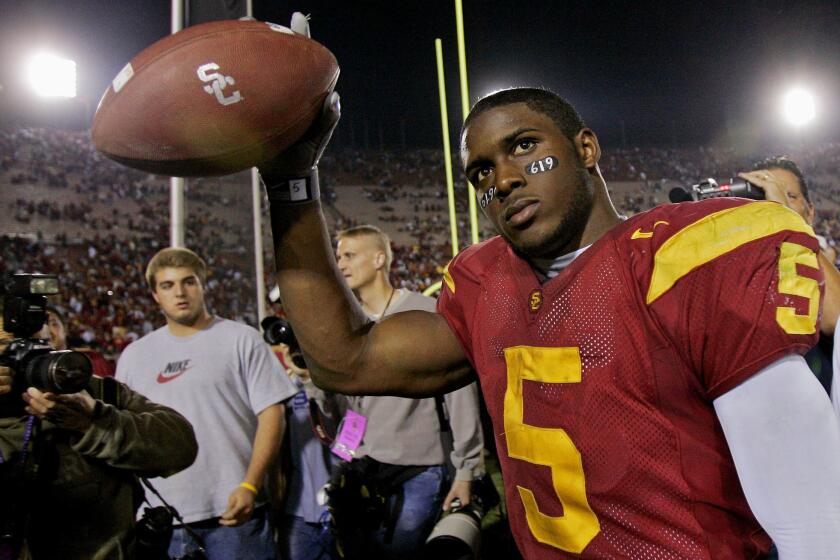A great ear for color
The cramped broadcast booth for AM 680, the Spanish-language outlet for the American League champion Tampa Bay Rays, is close enough to the infield of Tropicana Field to hear it all.
The crack of the bat, the ball’s loud pop as it is snared by the second baseman, the crowd cheering.
Enrique Oliu, color analyst for the Rays’ radio broadcasts, takes these sounds and spins them to life, making the game something a listener can see, even if he cannot.
Oliu is blind.
“And now, for the play-by-play, here’s the friend of apple pie, Ricky Taveras!” Oliu says in rapid-fire Spanish.
“Thank you, Volcano,” Taveras says, in a nod toward Oliu’s excitable on-air style.
“It doesn’t make sense, right?” Carlos Pena, the Rays’ All-Star first baseman, says of Oliu. “It’s unbelievable to me. But he does it. And he does it well.”
Oliu has an easy answer.
“If sight is perception,” he says, “I can see as much as the next person.”
And what he sees are the sounds of baseball.
“It’s not a carnival act,” says Oliu, 47. “My dad always said, do you want to play your own music or play someone else’s music?”
From his perch at Tropicana, Oliu rocks back and forth in a rhythm all his own while, on the field, the Rays tangle with the Boston Red Sox.
Taveras, a Dominican with a deep baritone voice made for radio, calmly describes the action while Oliu, with a voice about an octave higher, jumps in excitedly after every pitch.
“Here comes Price,” Taveras says as Rays pitcher David Price begins his windup. “Called strike again. A fastball on the outside corner, 93 miles per hour.”
“That’s what Price has to do,” Oliu adds. “Get ahead with his fastball early. Then he can throw his change and his curve. If he can locate his change, he’ll have success tonight.”
Oliu’s dark eyes, mostly hidden below bushy eyebrows and a forehead forever furrowed in a squint, have never registered anything other than extremely bright light and vivid colors -- and those, too, went dark when he was 8.
The sounds from the field and Taveras’ staccato play-by-play is all Oliu needs to see what the crowd sees.
“He doesn’t miss a beat,” says ESPN baseball analyst Orestes Destrade, a former major league player who recommended Oliu for the Rays’ job. “The stats he comes up with and the things he remembers -- obviously, God has given him some extra insight.”
Says Oliu: “I just think it’s different. People forget that a quarterback doesn’t really look at his receivers. A quarterback just knows the receiver’s supposed to be there and he throws to an area and the receiver’s supposed to cut. You forget that a lot of it is just instinct. Anything in life is a lot of instinct.”
Down on the field, Tampa’s Jason Bartlett comes to bat.
“Hard grounder in the hole at short,” Taveras says. “The throw to first. What a play! What a play by Jed Lowrie! He’s out!”
“Tremendous play,” says Oliu of Boston’s shortstop. “He went deep in the hole, got the ball, planted and fired. And it wasn’t just any runner. It was Jason Bartlett, who runs well. He went a long way to get that ball. He played it to the side. That was the only option he had.”
Oliu was born more than eight weeks early, before his retinas had a chance to fully develop. Yet he was raised no differently than his four siblings -- or any of the kids in the central Nicaraguan farming community where he grew up.
“I used to tell everybody at the house, ‘Be careful. Nobody says ‘poor Enrique,’ ” says his mother, Marilyn. “He was brought up just like he was one of the guys. He got to do everything the other kids did. Riding horses, swimming.”
School was a new challenge: When Oliu was 10, his mother sent him to live with an aunt in the U.S. so he could attend the Florida School for the Deaf and the Blind in St. Augustine.
“It was the hardest thing in my life,” she says, amid new tears over old memories. “But I saw how intelligent he was and how smart he was. And I said, ‘No, this kid, he needs to get an education.’ I don’t care what we have to do, but he needs to go to school. We can’t waste this intelligence. That’s probably why I made the sacrifice.”
What his mother saw as a sacrifice, however, Oliu saw as abandonment.
“Oh yeah,” says Oliu, who adjusted to the new surroundings while learning English and Braille. “It was culture shock.”
But the experience made him confident, self-sufficient. He carries a white and red retractable cane but rarely bothers to use it, preferring to softly lay a hand on someone’s shoulder or follow deftly in their footsteps to avoid unseen hazards.
“He definitely doesn’t act like he’s blind,” says Lorenzo Fernandez, a friend and former classmate at Florida College near Tampa. “He also doesn’t talk like he’s blind. He always says, ‘I saw that’ or ‘I saw this.’
“I would see him walking around campus and for the first month I didn’t realize he was blind.”
One day Fernandez and Destrade, both scholarship players at the college, invited Oliu to sit in the dugout during a game -- and then heard him doing the play-by-play.
“He’d hear the crack of the bat and call where it went, who caught it, where they threw it,” says Fernandez who, like many of Oliu’s friends, refers to him as Henry, the English equivalent of Enrique.
It is something Destrade would not forget.
It’s still the first inning when the Red Sox’s Dustin Pedroia lines a ball to the left of Rays center fielder B.J. Upton.
“Deep drive to right-center field!” says Taveras. “Upton going back comfortably. Under the ball and makes the catch. Two out.”
Adds Oliu: “This park, we’ve said many times, is very fair for hitters, for pitchers, for the defense. It’s a park that’s sufficiently big. And the Rays have speed to cover the territory in the outfield. That’s why it doesn’t surprise me that Price has pitched well as a starter at home.”
The job of color analyst is to fill the long pauses between short bursts of action. To prepare, Oliu studies scouting reports, press notes and media guides with the help of his wife, Debbie Perry, memorizing names, hometowns and loads of baseball stats. She often sits with him in the booth, watching the replay monitor and outfield scoreboard for him.
The idea of a blind color commentator isn’t new. Don Wardlow helped pave the way, working baseball games in the low minor leagues in the early 1990s. Oliu took a similar path, doing color commentary for a senior professional baseball league team in St. Petersburg, winning over a skeptical front office during a two-game trial.
Destrade recalls the then-fledgling Rays asking him to help put together a Spanish-language broadcast team.
“I said, ‘I got a color guy. Except the only issue here is, he’s blind.’ And they were like, ‘What?’ ” Destrade says. “I said trust me, this guy can do it. He knows the game inside and out. He knows more statistics than you can think of. And I think he’s perfect as a color guy.”
Oliu’s pregame preparation always includes a trip to the dugout and a visit with Manager Joe Maddon, with whom Oliu has a weekly radio show.
Last season, when the Rays called up a pitcher with an unusual delivery, Maddon grabbed Oliu’s arms and legs and patiently -- and repeatedly -- guided him through the windup, allowing Oliu to “see” what it looked like.
The only blind color analyst in major league baseball, Oliu has been with the Rays since 1998 and also has worked NFL and Arena Football League broadcasts, tennis matches and basketball games.
In a way, he helps sighted people see beyond what their eyes tell them. Still, as Rays catcher Dioner Navarro puts it, “He does something that nobody can explain.”
Maybe so, but Perry says there is no room for regret: “This is what I say to him. ‘Your being blind made you what you are.’ ”
--
More to Read
Get our high school sports newsletter
Prep Rally is devoted to the SoCal high school sports experience, bringing you scores, stories and a behind-the-scenes look at what makes prep sports so popular.
You may occasionally receive promotional content from the Los Angeles Times.
